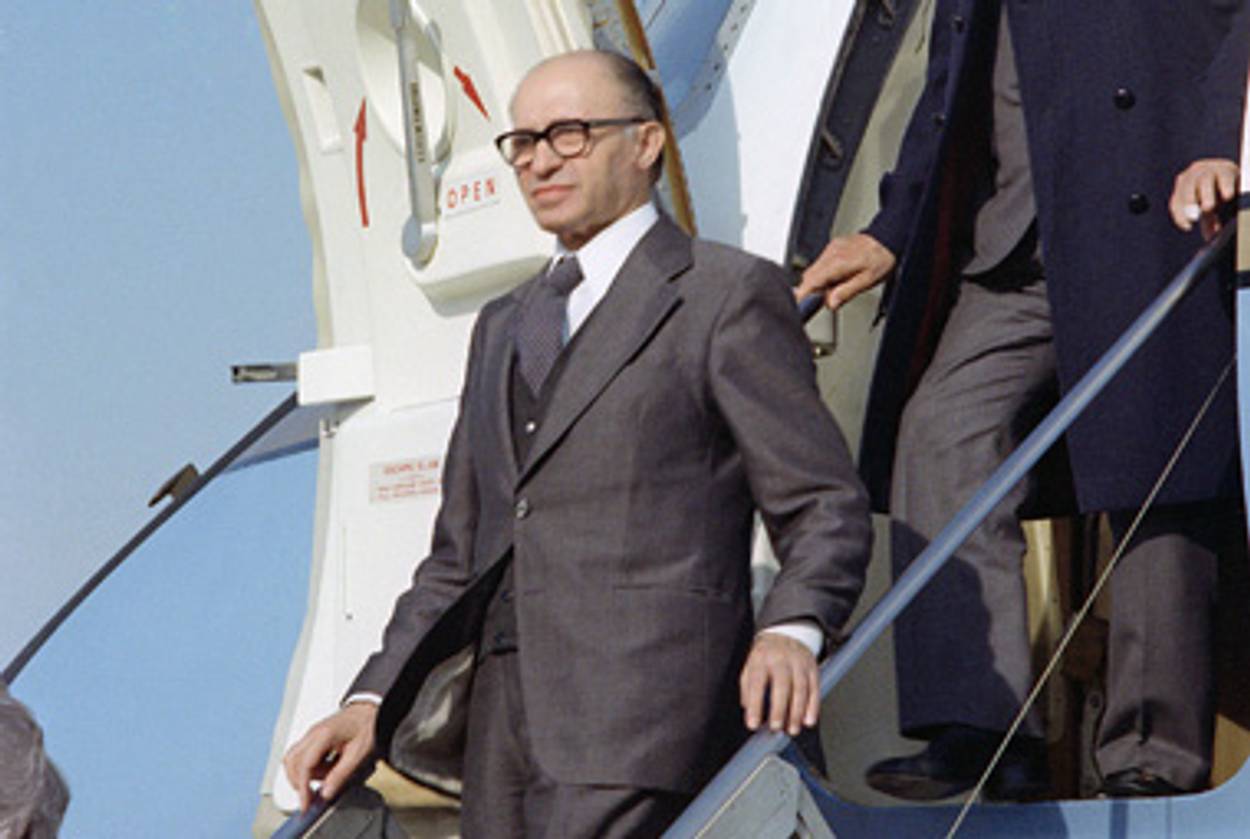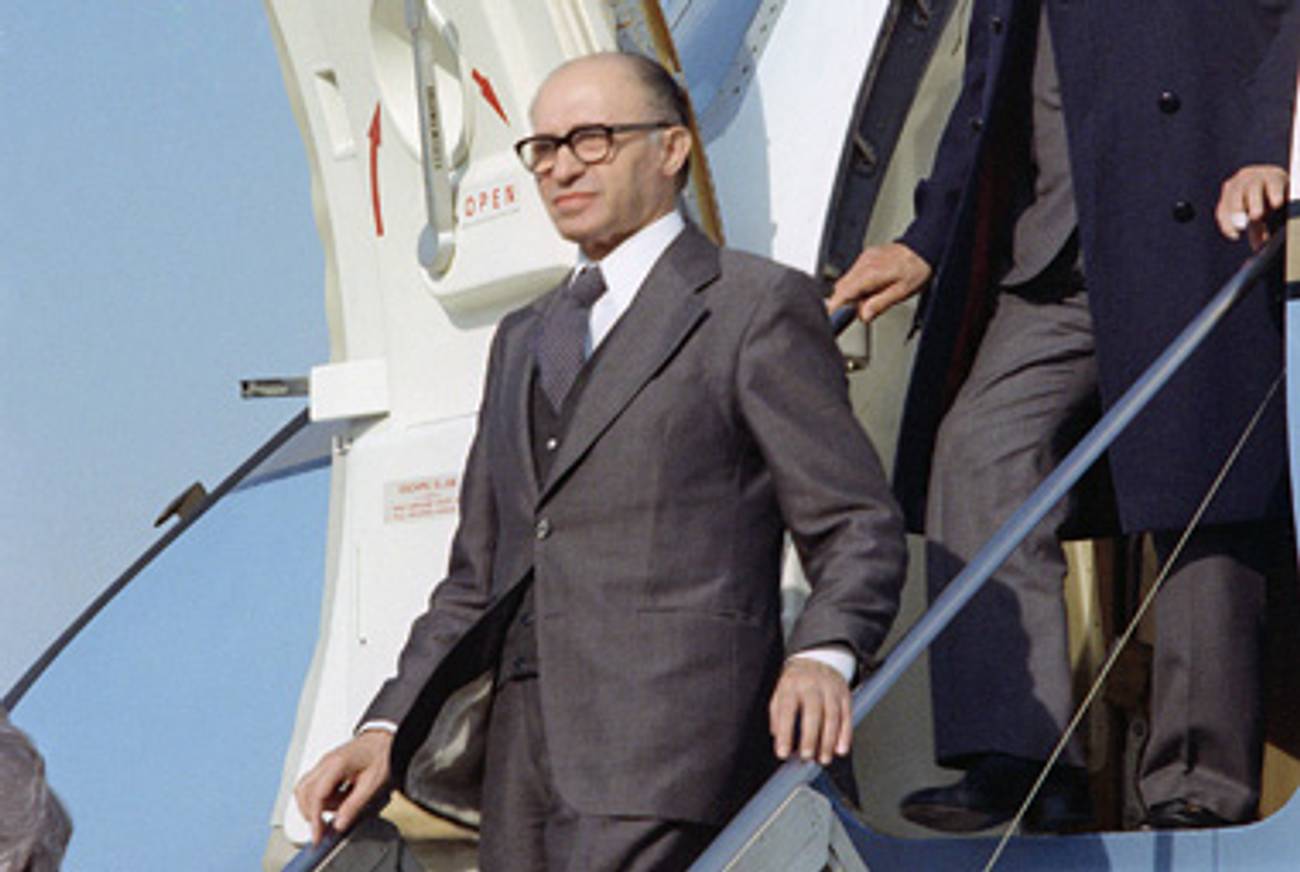What Would Begin Do?
Seeing the Iranian nuclear threat through the lens of Osirak




The latest disclosure in respect of Iran’s work on an atomic bomb—the International Atomic Energy Agency says the mullahs have the technical data needed to make a weapon—has me thinking about what happened in 1981, when Israel sent a flight of American-built warplanes to destroy a reactor that Iraq was building as part of a suspected program to manufacture a weapon. The thing that stands out from that episode is that it came out of the blue, not just literally but also politically.
Certainly there was plenty of concern about what Iraq was up to, but the long public debate, the hand-wringing, the threats, the counter-threats, the journalistic chorus about what a terrible thing a pre-emptive attack would be, how dangerous, none of this happened. One day Iraq had a nuclear reactor. The next day it didn’t. The attack was met with the usual outrage, but then a funny thing happened, and the tide began to turn in Israel’s favor, in part because Menachem Begin had no apologies.
At the time, I was in Philadelphia, visiting a family friend with my father. Both he and his friend, Dr. Teplick, were then in their late sixties. Both were liberal Democrats. We were having breakfast, going through the newspapers and talking about the astounding news, when Teplick encountered the editorial in The New York Times. It characterized Israel’s action as a “sneak attack” and called it an act of “inexcusable and shortsighted aggression.” As the editorial was read aloud at the table, I remember the chagrin of these two men, ardent liberals for whom the Times had long been at the center of their universe. They received the editorial as a betrayal.
My own reaction was to pick up the phone and call the Wall Street Journal’s editorial page, where I was then working. I reached a colleague, Adam Meyerson, and asked him to relay to George Melloan, who was Robert Bartley’s deputy and managed the editorial page, my own two cents, which was that the Journal shouldn’t do what the New York Times had just done. Adam asked me to hold the line for a moment. He came back on a few minutes later and said that he’d spoken with the magnificent Melloan, who had replied, “When have we ever done what the New York Times did?”
The editorial that Melloan and Bartley were planning ran the next day, on June 10, 1981, under the headline “Mourning the Bomb.” It began: “An atom bomb for Iraq, we have learned in the last 24 hours, has become the latest great cause célèbre of world opiniondom. Various governments, including our own, and a lot of pundits have been busily condemning Israel’s raid on Iraq’s nuclear reactor. Our own reaction is that it’s nice to know that in Israel we have at least one nation left that still lives in the world of reality.”
The editorial went on to speak of the incongruity of Iraq, “awash in cheap crude oil,” wanting a
big nuclear reactor. It noted that Baghdad had rebuffed “French suggestions to give up the original design and substitute one that does not need weapons-grade uranium.” The Journal was particularly exercised over the way “world opinion” was taking comfort in the fact that Iraq had signed the nuclear Non-Proliferation Treaty. It said: “This kind of silliness has a mysterious power to blind most who man foreign ministries, think tanks and editorial sanctums. Of course Iraq was building a bomb. Of course its intended target was Israel. Of course, given the Iraqi reputation for political nuttiness reaffirmed again in its starting a war with Iran, its atom bomb would also have been a danger to all its neighbors.”
Then the famous sentence: “We all ought to get together and send the Israelis a vote of thanks.”
The Journal recognized that Israel “was not acting out of some abstract concern with nonproliferation.” It presumed that Israel was “pursuing its own interest” and conceded the timing of the raid was “no doubt” in Begin’s “political interest in the impending elections.” But the Journal reckoned that the strong medicine of the pre-emptive attack “would not have been necessary” had “the reality that marked the Israeli decision been present in the United States’ nonproliferation policy this last decade or so.” It cited not only France’s sales to Iraq but India’s atomic program.
A point was made to give, as the Journal put it, “the worriers about Israel their due.” It noted that “there is always reason to be concerned that any military act could prove to be the spark in the tinderbox of the Middle East. “ But, it said, “we have been under the impression that the Middle East wasn’t a very peaceful place even before” the attack on Osirak. It concluded by noting that being “concerned about the peace of the Middle East does not make it necessary to be deceived about the necessary components for peace.”
What the Journal was supporting then was not Zionism, per se, nor, for that matter, any other ideological line of right or left but rather a certain hard-headedness, an honesty, about America’s, and other nations’, interests. It proved merciless in criticizing those, including its great friend Jeane Kirkpatrick, who was then President Reagan’s envoy at the United Nations, who’d drawn the unfortunate assignment to coauthor, with an envoy of Iraq, a resolution condemning Israel’s raid. It provoked in the Journal a fierce editorial called “Andy Kirkpatrick,” which likened the hawkish, pro-Israel Kirkpatrick to President Carter’s permanent representative at the world body, Andrew Young.
It later came out that Reagan was less worried about the attack privately than his envoys had to be publicly. His national security adviser, Richard Allen, informed his boss of the Israeli raid by asking him something roughly like this: “Mr. President, you know those F-16s we provided Israel? Guess what they have done with them? They’ve bombed a nuclear reactor in downtown Baghdad.” Reagan is said to have stammered: “They did what?” When Allen repeated the facts, Reagan shook his head, uttering the famous line, “Well, boys will be boys.”
Today, everyone is more tense. The amount of debate, in and out of government, and diplomacy on the matter stands in sharp contrast to the earlier time. All the leaders of the West—not just President Obama—have stood up and pronounced an Iranian A-bomb unacceptable. The question is whether they are going to conduct themselves in a way that is consonant with that conclusion. Surely Iran is a more difficult military mission than Iraq was, though our weapons systems are also more advanced. But surely Iran is further along the road to a bomb-making capacity than Iraq was. Menachem Begin refrained from debating any of this in public before he made his attack, and then one day there was no reactor in Iraq—a fact that eventually came to be viewed with a great deal of relief by the rest of the world.
Seth Lipsky, formerly editor of the English-language edition of the Forward, is founding editor of The New York Sun.
Seth Lipsky, formerly editor of the English-language edition of the Forward, is founding editor of The New York Sun.